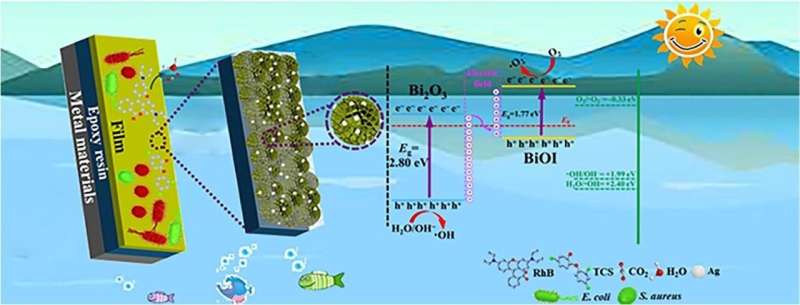Novel supporting material for photocatalyst powders' recyclable application

Various photocatalyst powders can remove contaminants and microorganisms from water efficiently, but their practical application is limited due to poor recovery performance.
Previous studies used magnetron sputtering and electrodeposition to obtain the bismuth-containing seed layer for bismuth-based photocatalytic film hydrothermal in-situ grown onto various substrates. However, this process is sophisticated and energy-consuming.
Recently, a research team led by Prof. Zhang Dun from the Institute of Oceanology of the Chinese Academy of Sciences (IOCAS) provided a kind of novel epoxy resin mediate layer for hydrothermal in-situ grown photocatalyst onto various metals.
The study was published in Separation and Purification Technology on March 15.
The researchers found that the photocatalytic film with similar flower-like morphology could grow onto epoxy resin–coated metals. The epoxy resin intermediate layer exhibited a distinguishing functionality of this work, with unconstrained selectivity to metal substrates.
The dipole-dipole interactions between the stabilizer polyvinyl pyrrolidone (PVP) and epoxide group of epoxy resin were conducive to form the photocatalytic film of hydrothermal in-situ grown active sites. Dissolution-recrystallization processes occurred at the edge of the newly formed nano-sheets. These nano-sheets were continuously stacked and assembled, and a flower-like microsphere film was gradually formed layer upon layer on metals.
"By contrasting with powdered bismuth-based photocatalyst, the film showed similar photocatalytic activity, indicating that the transformation from powdered photocatalytic to film can maintain good photocatalytic activity," said Xu Xuelei, first author of the study.
"Inducing epoxy resin as the media layer that substitutes bismuth seed layer is simple and convenient," said Prof. Zhang.
"The film composed of N, P-doped heterostructure may also have potential for removing contaminants and microorganisms. Therefore, this work highlights the development of convenient, economical, recycled and universal photocatalytic film on various metals for contaminants degradation and microorganism killing," said Prof. Wang Yi, the corresponding author of the study.
More information: Xuelei Xu et al, A novel strategy of hydrothermal in-situ grown bismuth based film on epoxy resin as recyclable photocatalyst for photodegrading antibiotics and sterilizing microorganism, Separation and Purification Technology (2022).
Provided by Chinese Academy of Sciences





















